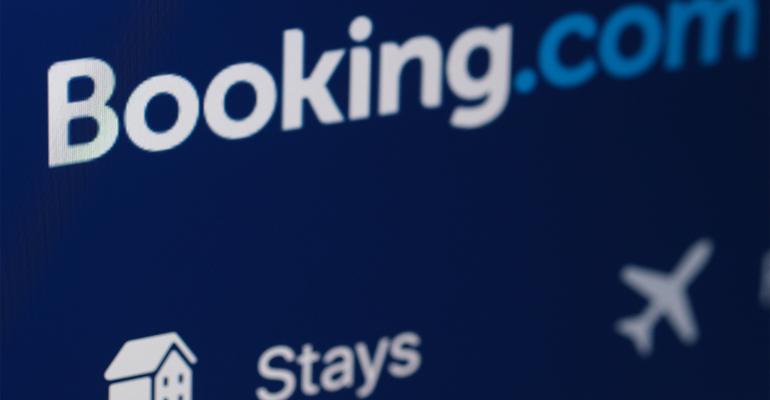(Bloomberg)—Booking Holdings Inc. saw a significant jump in the number of room-night reservations made in the first quarter compared with the end of last year, showing the world’s biggest online travel agent is starting to benefit from pent-up demand as more people become vaccinated and look forward to vacation.
After a year of unprecedented revenue declines due to pandemic-related lockdowns and border closures, Booking is hoping the Covid-19 infections will slow enough in time to save its summer boom. The company saw room-night bookings decline only 20% from a year earlier for the period ended March 31, as travelers started making vacation plans for the year ahead. Room nights booked were down 60% in the fourth quarter.
However, Covid still weighed heavily on Booking’s first-quarter results. Revenue fell 50% from a year earlier to $1.14 billion, the Norwalk, Connecticut-based company said in a statement Wednesday, in line with the average analyst estimate of $1.16 billion. Gross travel bookings, which represent all travel services booked by customers, dipped only 4% to $11.9 billion. Analysts projected $10.3 billion, according to data compiled by Bloomberg.
“We saw encouraging signs of improving booking trends in the first quarter that continued into April with notable strength in the U.S.,” Chief Executive Officer Glenn Fogel said in the statement.
The travel industry has been gutted by the coronavirus pandemic, which caused most of the world to shut down last year. Booking saw its room-night reservations drop as much as 85%, forcing the company to eliminate thousands of jobs and apply for government aid. Booking saw a brief respite in domestic travel through summer last year, but surging infections in the fall and winter brought a a new wave of restrictions. Meanwhile, international travel has been all but impossible, with many countries shutting out foreigners and imposing strict quarantine rules upon arrival. Despite all this, investors have been optimistic about prospects for recovery in the industry, pushing travel stocks well above their pre-pandemic levels as they bet on a post-Covid world.
Chief Financial Officer David Goulden said he expected room-night reservation declines to improve in the current quarter. Room-nights were down about 43% in April compared with 2019 levels, he said, which was an improvement from March. The rebound was being led by domestic travel with some countries, like the U.S., seeing strong room-night trends, while others, like India, still struggling, Goulden said during a conference call after the results were released. Room-night reservations declined more than 50% in Europe, while Asia was the least recovered region globally, he said.
Executives declined to provide an official outlook for the current period because of ongoing uncertainties with virus outbreaks and vaccine distribution.
“The exact shape and time of the full recovery for travel remains uncertain,” Fogel said on the call, adding that it was entirely dependent on international travel. “Many governments may be cautious in fully opening international travel for some time,” he said.
Booking’s recovery trajectory has been lagging behind that of rivals Expedia Inc. and Airbnb Inc. due to its higher exposure in Europe, which has historically made up about 60% of its revenue. Europe’s slow vaccine rollout and ongoing Covid outbreaks caused some analysts to temper their expectations for the next year.
“Europe has been slower than expected in terms of its recovery and that’s why we went ahead and lowered our estimates for 2021 and 2022,” Cowen senior analyst Kevin Kopelman said in an interview before the results were released. Currently 18% of adults in Europe have had at least one dose of the vaccine, compared with just under 40% in the U.S. Kopelman estimates Booking’s full recovery won’t come until 2023.
Other analysts and industry experts predict the rebound will come sooner for Booking, which runs major brands like Priceline, Kayak and Agoda. The company’s main brand, Booking.com, has seen a sharp rebound in app downloads in North America and Europe in the last two months, which could be a sign of a strong bounce back, according to Bloomberg Intelligence analyst Mandeep Singh.
As the travel recovery gains speed, the industry is closely eyeing the alternative accommodation sector as travelers opt for vacation rentals over traditional hotels more than ever. The remote-work movement has led U.S. city dwellers to mountain villages and beach towns for socially distanced getaways and months-long staycations -- a phenomenon that has benefited Airbnb and Expedia’s vacation rental unit, Vrbo, which have a bigger market share in North America. Vacation homes, apartments and non-hotel accommodations account for more than 6.5 million listings across Bookings’ sites and represented about 30% of room nights booked last year. Company executives plan to increase Booking’s whole-home rental offerings in the U.S. by courting hosts from Airbnb and Vrbo.
Booking reported an adjusted loss before interest, taxes, depreciation and amortization of $195 million, while analysts were expecting a loss of $161.3 million. The adjusted loss per share was $5.26, analysts expected a loss of $5.97.
Booking shares were little changed in extended trading after closing at $2,337.92. They have gained 5.4% this year.
© 2021 Bloomberg L.P.





